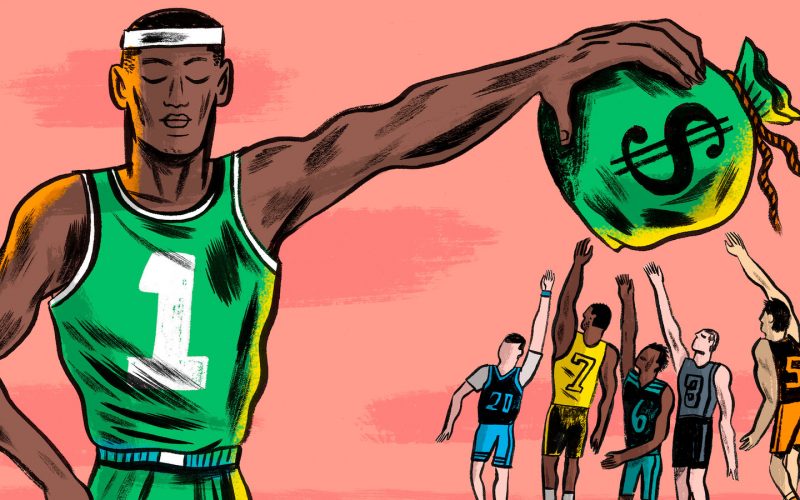College athletes – they bring in the crowds, pack the stadiums, and make highlight reels epic. But behind all the cheers, there’s a question that’s been around for years: should college athletes actually get paid? Why should college athletes be paid?
It’s a complex issue, for sure. College athletes dedicate tons of time and energy to their sport, while universities make a lot of money from their games and merchandise. So, is it fair that the athletes themselves don’t see a dime?
In this article, we’ll talk about things like the time commitment athletes face, the money universities bring in from sports, and the fact that athletes deserve to be compensated for their hard work.
Table of contents
- What is College Athletics?
- Why Should College Athletes Be Paid?
- #1. Enhancing Fairness and Equity
- #2. Recognizing the Value They Bring
- #3. Rewarding Effort and Dedication
- #4. Addressing Financial Struggles
- #5. Preparing for Professional Careers
- #6. Encouraging Education
- #7. Promoting Accountability and Compliance
- #8. Enhancing Athlete Welfare
- #9. Nurturing Life Skills
- #10. Ensuring Long-term Success for College Sports
- What Paying Athletes Could Mean for College Sports
- Reasons Why College Athletes Should Not Be Paid
- The Alternatives to Directly Paying College Athletes
- Scholarships and Financial Aid
- Comprehensive Healthcare Coverage
- Expanding Educational Resources and Support Systems
- Enhanced Opportunities for Skill Development and Career Advancement
- Revenue-sharing Models
- NIL Profits
- Implementation of Cost-of living Stipends
- Educational Trust Funds
- Combination of all Alternatives
- FAQs
- Conclusion
- References
- Recommendations
What is College Athletics?
College athletics refers to organized sports programs that take place within colleges and universities. These programs offer students the opportunity to compete in various sports at an intercollegiate level, representing their educational institutions.
College athletics play a significant role in the overall college experience, fostering a sense of community, school spirit, and healthy competition among students.
College athletics provide a platform for student-athletes to showcase their skills and talent while pursuing their academic goals. These programs encompass a wide range of sports, including basketball, football, soccer, baseball, track and field, swimming, and many more. Student-athletes participate in rigorous training regimens, balancing their athletic commitments with their studies.
Additionally, college athletic programs are usually organized by the National Collegiate Athletic Association (NCAA) in the United States, which sets the rules and regulations governing intercollegiate sports.
The NCAA consists of different divisions, with Division I being the highest level of competition. Division I schools often receive significant media coverage and attract large crowds to their games and events.
Moreover, participation in college athletics is voluntary, and student-athletes must meet certain academic and eligibility requirements to represent their schools. These requirements ensure that student-athletes maintain a balance between their athletic pursuits and their academic progress.
Student-athletes are expected to maintain a satisfactory grade point average (GPA) and make progress toward their degree while remaining active in their chosen sport.
See Also: Should College Be Free: YES/NO? Pros And Cons
Why Should College Athletes Be Paid?
There are several compelling reasons why college athletes should be paid for their participation in college sports.
Let’s explore these reasons, highlighting the significance of fair compensation for these dedicated student-athletes.
#1. Enhancing Fairness and Equity
One of the reasons college athletes should be paid is to enhance fairness and equity. By compensating college athletes, we can address the inherent imbalance that exists within collegiate sports.
These athletes dedicate countless hours to training and competing while also juggling their academic responsibilities. Paying them would level the playing field, allowing them to focus on their studies without worrying about financial constraints.
#2. Recognizing the Value They Bring
Another reason college athletes should be paid is to recognize the value they bring. College athletes are instrumental in generating revenue for their institutions through ticket sales, merchandise, and TV deals.
Without their exceptional talent and hard work, many colleges would not enjoy the financial prosperity they do. By paying athletes, we acknowledge and appreciate the value they bring to their schools.
#3. Rewarding Effort and Dedication
Another reason college athletes should be paid is to reward effort and dedication. College athletes invest a tremendous amount of time and effort into their sport.
They commit to grueling training sessions, adhere to strict schedules, and make sacrifices that often go unnoticed. Offering financial compensation would recognize their dedication and motivate them to continue performing at their best.
#4. Addressing Financial Struggles
Another reason college athletes should be paid is to address financial struggles. Many college athletes come from disadvantaged backgrounds, and they often face financial hardships.
Hence, paying these athletes would alleviate some of their economic burdens, allowing them to focus on their education and athletic pursuits without the constant worry of making ends meet.
#5. Preparing for Professional Careers
Another reason college athletes should be paid is to prepare them for professional careers. For some athletes, college sports serve as a stepping stone to a professional career.
Compensation during their college years would provide a vital financial foundation for their transition into the competitive world of professional sports.
See Also: What Should A Student Do In High School To Become An Astronaut?
#6. Encouraging Education
Another reason college athletes should be paid is to encourage education. Compensating college athletes would also serve as an incentive for them to stay in school and complete their degrees.
Currently, the demands of collegiate sports can overshadow the academic pursuits of these students. By providing financial stability, we encourage them to prioritize their education, ensuring their long-term success both on and off the field.
#7. Promoting Accountability and Compliance
Another reason college athletes should be paid is to promote accountability and compliance. The debate over compensating college athletes has shed light on the issue of fairness and ethics within the NCAA.
Implementing a fair payment system would promote accountability and compliance, ensuring that all student-athletes receive their due compensation within a regulated framework.
#8. Enhancing Athlete Welfare
Another reason college athletes should be paid is to enhance athlete welfare. One crucial aspect is the potential for college athletes to face significant health risks and injuries due to their participation in high-impact sports.
Financial compensation would enable these athletes to access better healthcare and medical facilities, promoting their overall well-being and reducing the financial burden that arises from medical expenses.
#9. Nurturing Life Skills
Another reason college athletes should be paid is to nurture their life skills. College athletes acquire invaluable life skills through their participation in sports.
By compensating them, we acknowledge the development of qualities such as teamwork, leadership, discipline, and time management, which the professional world highly values.
#10. Ensuring Long-term Success for College Sports
Lastly, one of the reasons college athletes should be paid is to ensure long-term success for college sports. Paying college athletes can help secure the long-term success and sustainability of college sports.
By treating athletes fairly, we ensure that the most talented individuals choose to participate in collegiate athletics, ultimately benefiting the fans, the schools, and the sports industry as a whole.
What Paying Athletes Could Mean for College Sports
The idea of paying college athletes has far-reaching implications for the landscape of collegiate sports. Let’s explore what this change could mean for the future of college athletics, considering the potential benefits and consequences.
Paying athletes would likely lead to a more competitive environment within college sports. Student-athletes, knowing that their efforts are financially recognized, would be motivated to perform at their best and attract the attention of professional scouts.
This increased competitiveness would raise the overall level of play and excitement in college sports, drawing in more fans and spectators.
Additionally, financial compensation for college athletes could also help reduce the disparities between larger and smaller sports programs. Currently, a handful of sports, such as football and basketball, receive the lion’s share of attention and funding, while others struggle to maintain adequate resources.
Paying athletes would create a more equitable distribution of resources, enabling smaller programs to compete on a more level playing field.
Additionally, paying athletes would likely lead to a more sustainable and professionalized approach to college sports. With compensation, athletes could afford better training facilities, nutrition programs, and sports science resources, ultimately improving their performance and reducing the risk of injuries. This enhanced focus on athlete welfare would contribute to the overall growth and development of college sports.
Lastly, it’s important to consider the potential challenges and consequences of paying college athletes. Introducing compensation could create a divide between revenue-generating sports and non-revenue-generating sports, as there may be disproportionately allocation of limited resources.
Additionally, determining fair and equitable compensation for athletes across various sports and institutions would require careful consideration and regulation.
Reasons Why College Athletes Should Not Be Paid
While the idea of paying college athletes has gained traction, there are valid arguments against implementing such a system.
Let’s explore ten reasons why some believe college athletes should not be paid, considering the potential implications and challenges that may arise.
#1. Amateurism Preservation
College sports are founded on the principles of amateurism, emphasizing the participation of students for the love of the game rather than financial gain.
Paying athletes would fundamentally alter the essence of college athletics, blurring the line between amateur and professional sports.
#2. Financial Sustainability
Most college athletic programs already operate on tight budgets, struggling to maintain financial stability.
Introducing payment for athletes could strain these budgets further, potentially leading to the reduction or elimination of non-revenue sports programs and compromising the overall integrity of collegiate sports.
#3. Educational Focus
This is one of the reasons some think college athletes should not be paid. Moreover, the primary purpose of attending college is to obtain an education and prepare for future careers.
Paying athletes could shift the focus away from academics, as they may prioritize their athletic commitments over their studies, undermining the educational mission of colleges and universities.
Read: Should Students Get Paid Money For Having Good Grades? Pros and Cons
#4. Title IX Compliance
Furthermore, Title IX compliance is one of the reasons some think college students should not be paid. Remember that Title IX is a federal law that prohibits gender discrimination in educational institutions.
Paying athletes could create challenges in ensuring equal treatment and compensation for both male and female athletes, potentially infringing upon the principles of Title IX.
#5. Inequitable Distribution
Determining fair and equitable payment for college athletes across different sports and institutions would be complex.
Revenue-generating sports programs might attract higher compensation, exacerbating disparities between larger and smaller schools and leading to an imbalance in the college sports landscape.
#6. Potential Exploitation
Paying college athletes may open the door to potential exploitation by external entities, such as boosters or sponsors.
There is a risk of athletes being enticed to specific schools or facing undue influence in their decision-making, compromising the integrity and fairness of college sports.
#7. Professional Opportunities
Additionally, college sports provide a platform for talented athletes to showcase their skills and attract the attention of professional leagues.
Paying athletes could diminish the motivation to excel and seek opportunities at the professional level, as they may be content with the financial compensation they receive in college.
#8. Educational Debt
Moreover, many college students graduate with significant educational debt. Paying athletes could create a perception of preferential treatment, as they would receive compensation while other students bear the burden of student loans. This may lead to a sense of unfairness among non-athletic students.
#9. Impact on Non-Revenue Sports
Additionally, college athletic programs encompass both revenue and non-revenue sports.
Paying athletes in revenue-generating sports could divert resources and attention away from non-revenue sports, potentially jeopardizing the opportunities available to athletes in these less popular sports.
#10. NCAA Compliance
Furthermore, the National Collegiate Athletic Association (NCAA) governs college sports and sets regulations to ensure fair play, eligibility, and amateurism.
Introducing payment for athletes would require significant restructuring of existing rules and regulations, potentially leading to compliance challenges and controversies.
The Alternatives to Directly Paying College Athletes
While the idea of paying college athletes continues to spark debate, there are alternative approaches that can address some of the concerns and challenges associated with direct payment.
Exploring these alternatives allows us to consider different ways to support college athletes without fundamentally altering the amateurism model.
Scholarships and Financial Aid
Firstly, one alternative to direct payment is enhancing the support provided to college athletes through improved scholarships and financial aid.
By increasing the value of athletic scholarships, athletes would receive additional financial assistance to cover their educational expenses.
This approach ensures that athletes are provided with the means to pursue their education without compromising the principles of amateurism.
See also: What are Voluntary Aided Schools? Definition, Course, Fees, Admission 2024
Comprehensive Healthcare Coverage
Additionally, another alternative is providing comprehensive healthcare coverage for college athletes. College sports can be physically demanding, and athletes often face the risk of injuries.
By offering robust healthcare coverage, including medical expenses and insurance, athletes would receive the necessary support to address their healthcare needs without the need for direct payment.
Expanding Educational Resources and Support Systems
Moreover, an alternative approach involves expanding educational resources and support systems for college athletes. This includes investing in academic advising, tutoring programs, and career development services tailored specifically to the needs of athletes.
By prioritizing their academic success and post-graduation prospects, colleges can demonstrate their commitment to the holistic development of student-athletes.
Enhanced Opportunities for Skill Development and Career Advancement
In addition, colleges can provide athletes with enhanced opportunities for skill development and career advancement.
This can involve establishing partnerships with professional sports organizations, creating internships or job placement programs, and offering mentorship opportunities.
By facilitating these pathways, athletes can gain valuable experience and exposure, increasing their chances of success beyond college sports.
Revenue-sharing Models
Additionally, revenue-sharing models are another alternative that can benefit college athletes indirectly.
Instead of directly paying athletes, they can allocate a portion of the revenue of college sports programs towards improving athletic facilities, enhancing coaching staff, and providing additional resources for athletes.
This ensures that they reinvest the financial success of college sports back into the athletic program, ultimately benefiting all athletes.
NIL Profits
Moreover, institutions can also explore the concept of allowing athletes to profit from their name, image, and likeness (NIL). This approach enables athletes to enter into endorsement deals, receive compensation for autographs or appearances, and monetize their brand.
By granting athletes the right to capitalize on their image and likeness, they can gain financial opportunities without directly receiving payment from the college or university.
Implementation of Cost-of living Stipends
Furthermore, another alternative is implementing cost-of-living stipends for college athletes.
Recognizing that the demands of being a student-athlete can be financially burdensome, providing stipends to cover basic living expenses can alleviate some of the financial pressures.
This approach acknowledges the unique challenges faced by athletes and ensures they can meet their essential needs without crossing the line into professional payment.
Educational Trust Funds
Additionally, creating educational trust funds is another alternative that can support college athletes in the long term.
A percentage of the revenue generated from college sports could be allocated to these trust funds, which would be accessible to athletes after they graduate.
This financial support can assist athletes as they transition to professional sports or pursue their careers outside of athletics, offering a sustainable form of assistance.
Combination of all Alternatives
Finally, they can explore a combination of these alternatives to create a comprehensive framework that addresses the various needs of college athletes.
By adopting a multifaceted approach, institutions can provide financial, educational, and career support that goes beyond direct payment, while preserving the principles of amateurism and the collegiate experience.
FAQs
No, college athletes do not receive direct payment for participating in sports.
Paying college athletes recognizes their contributions, addresses financial hardships, and acknowledges the value they bring to their institutions.
Ethical concerns include preserving amateurism, avoiding exploitation, ensuring gender equality, and maintaining transparency and compliance.
There is a risk of creating an unequal distribution of resources and attention between revenue-generating and non-revenue-generating sports programs.
The financial feasibility of paying college athletes depends on various factors such as revenue sources, budget allocation, and potential restructuring of college sports programs.
Conclusion
The question of whether college athletes should be paid is a complex issue with passionate arguments on both sides.
However, by considering the ten compelling reasons outlined above, it becomes clear that providing compensation to college athletes is a step toward fairness, equity, and the overall improvement of collegiate sports.
It is time to recognize and reward the tremendous contributions and sacrifices made by these athletes.
References
- Fightful.com – 8 Reasons Why College Athletes Should be Paid
- Research.com – Why Should College Athletes Be Paid?
- Bestcolleges.com – Should College Athletes Be Paid?
- Blogs.elon.edu – CONNOR JOHNSON: PAYING COLLEGE ATHLETES IN ALTERNATIVE FORMS
- Sportico.com – NAME, IMAGE, AND LIKENESS: A GUIDE TO COLLEGE ATHLETE NIL DEALS, COMPENSATION





